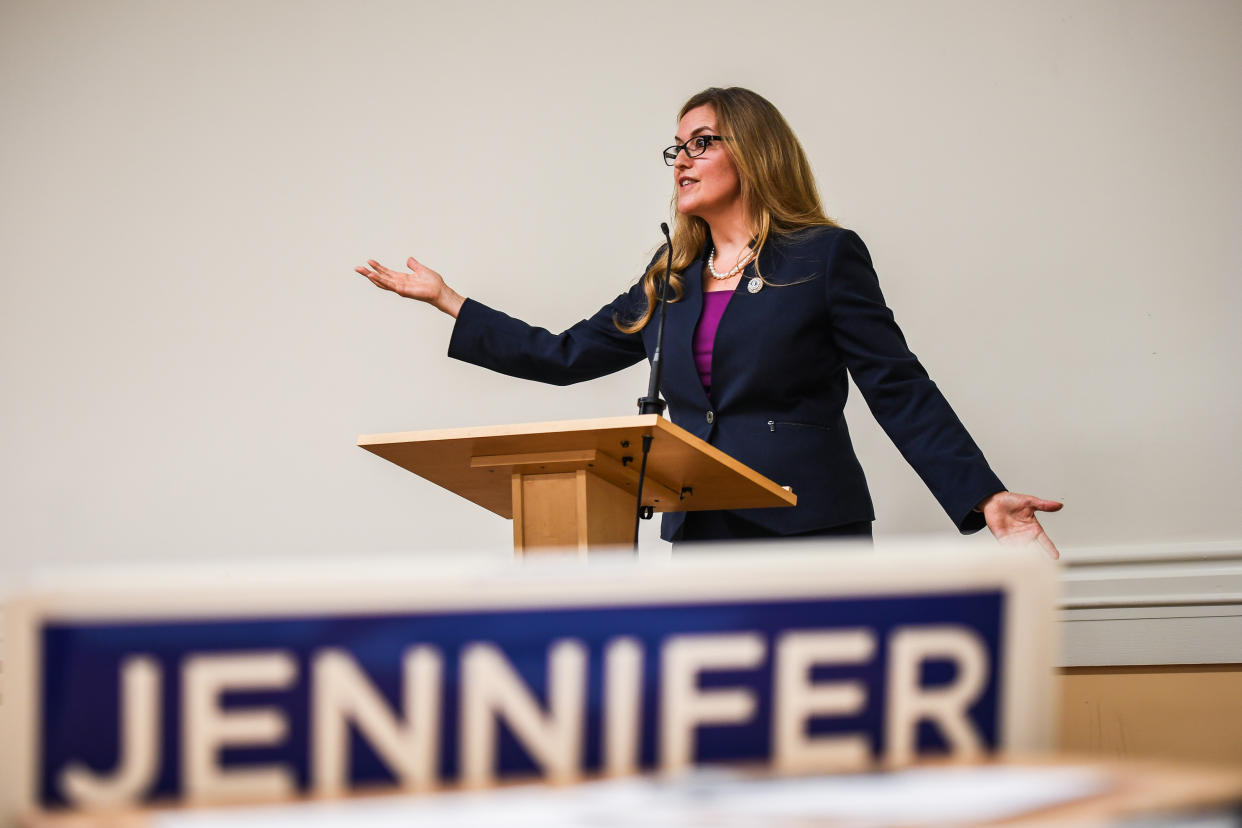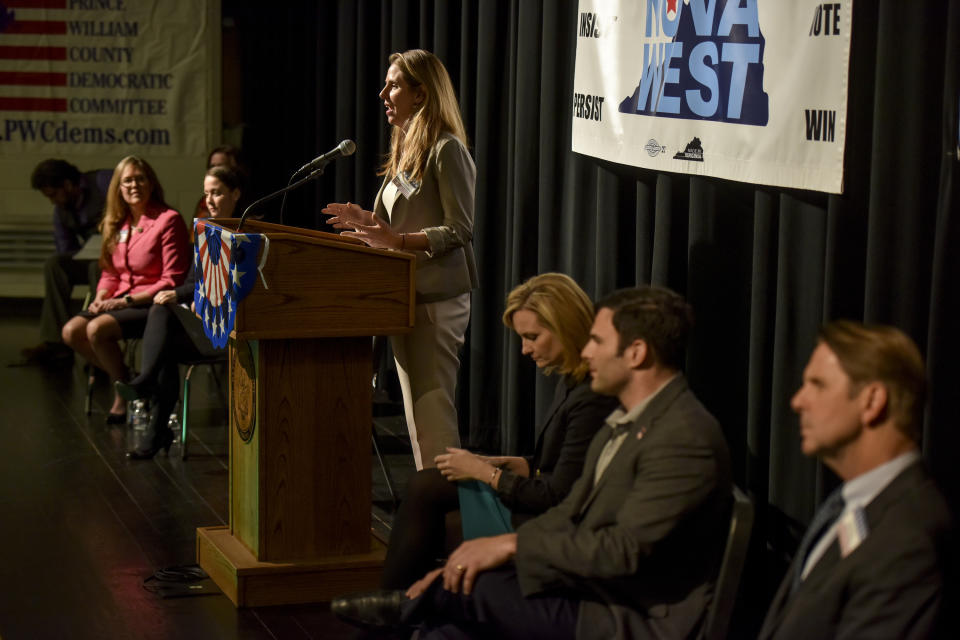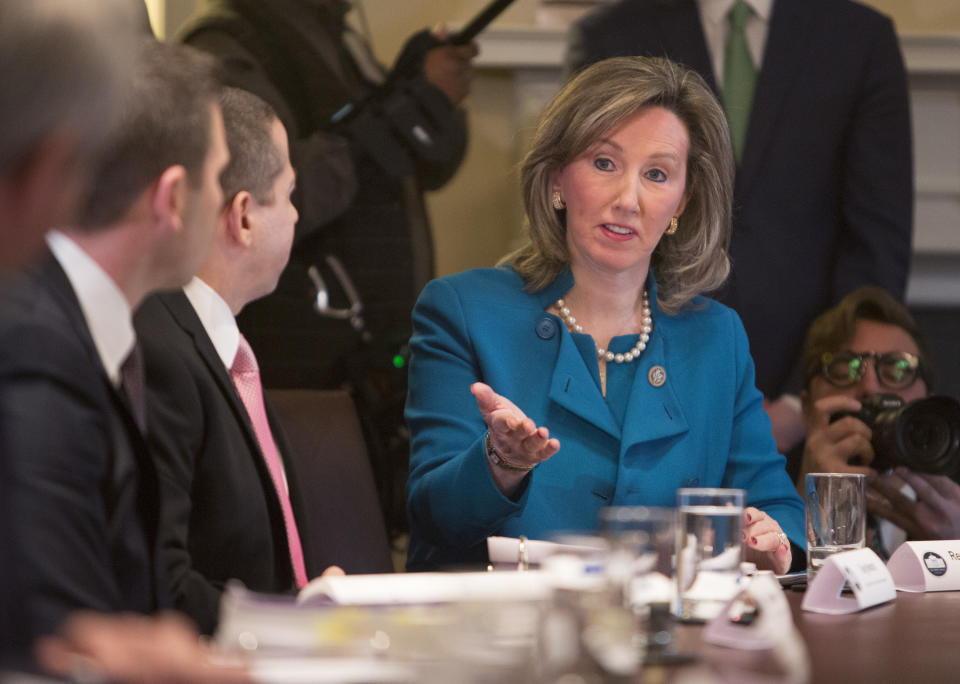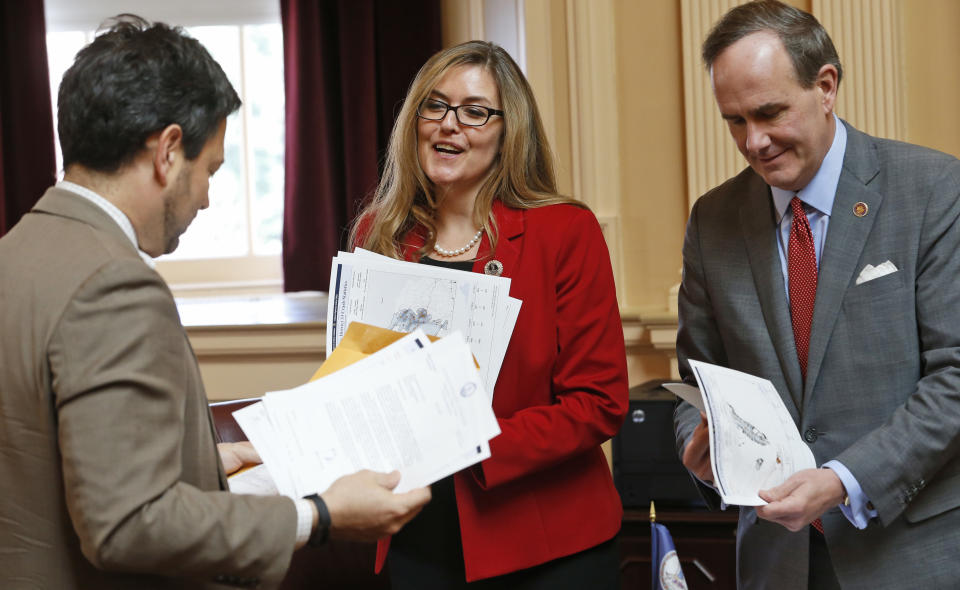Virginia congressional primary will be a test for an establishment Democrat, as party seeks to flip the House

WASHINGTON — For Democrats looking to retake the U.S. House of Representatives, Virginia’s 10th Congressional District is a prime target. Hillary Clinton won it in the 2016 presidential election and the Republican incumbent suffers from tepid approval ratings.
But before Democrats can pop the victory champagne, they first need to decide what kind of candidate, and race, they want to run.
State Sen. Jennifer Wexton would normally have the clearest path to winning a crowded Democratic primary on June 12 and facing Republican Rep. Barbara Comstock in the general election. She represents about half of the largest county, Loudoun, in the 10th district, and has been on the ballot three times since 2011, helping solidify her name in the minds of voters.
Wexton has developed a reputation in Richmond as a serious lawmaker, and has the endorsement of Gov. Ralph Northam and a host of state legislators, as well as from the two Democratic congressmen from northern Virginia, Gerry Connolly and Donald McEachin.
But Wexton has faced stiff competition in fundraising from three other Democratic primary foes, trailing one and barely edging out two others.
Most observers think Wexton is still the frontrunner, and that her chief competitor is Alison Friedman, an anti-human trafficking activist who worked in the Obama State Department. But without any real public polling, it’s impossible to discount two other candidates, Army officer Dan Helmer and another former Obama administration official, Lindsey Davis Stover.

Friedman has raised the most money — over $1.3 million as of the last reporting period — though a good portion of it has been from donors outside of Virginia. Wexton has raised over $900,000, with Helmer close behind at just under $900,000 and Stover at around $850,000.
Former federal prosecutor Paul Pelletier has raised around $400,000, and although the sixth candidate, scientist Julia Biggins, has raised only about $100,000, she has been endorsed by One Revolution, the outside group that was started in 2016 to support Sen. Bernie Sanders’s presidential candidacy.
The surprising depth of candidates and the amount of money raised for each is just one of many indications of how energized Democrats have been by the rise of Donald Trump.
Wexton’s built-in advantage includes the fact that she has already won the kind of vote share she’ll need to succeed on June 12. In an unsuccessful run for Loudoun County Commonwealth’s Attorney in 2011, she received 24,000 votes. In this year’s primary, six Democrats are competing for an estimated 40,000 votes, give or take a few thousand.
The question is, will Wexton’s status as an elected official prove an asset, or will the hunger for political neophytes seen in other parts of the country be as strong here?
Helmer, an Army lieutenant colonel who left active service three years ago but remains active in the reserves, told Yahoo News that the most important criterion for the Democratic primary is “having a candidate who can beat Barbara Comstock.”

Comstock is running for her third term and is a formidable politician who has far out-raised all the Democrats, with almost $3 million as of the last reporting period. “Barbara Comstock has beaten every politician she has come up against,” Helmer said. “It’s going to take someone with a different profile who can contrast themselves.”
A spokeswoman for Friedman, who also has never run for office, also said that experience in office and endorsements from other elected officials may not deliver much of an advantage. “It seems, based on the past year or so, that people are more excited about candidates who are coming from outside the establishment,” said Wellesley Daniels, Friedman’s communications director.
The 2017 Democratic primary for governor offers important insights. Northam defeated challenger Tom Perriello handily in Fairfax County, by 20 points. And one quarter of the registered voters in the 10th district are from Fairfax County. But a greater percentage of the district, about 44 percent, comes from Loudoun County, where Northam beat Perriello by only three points. The takeaway is that voters closer to the city were more supportive of Northam than of Perriello, the younger candidate who ran on a more progressive message. Northam’s appeal was that he would be a “gets things done” candidate in the general election against Republican Ed Gillespie, according to Northam’s campaign manager, Brad Komar.
“I think Sen. Wexton is very much in that mold,” Komar told Yahoo News, adding, “The typical Fairfax County primary voter is a 72-year old woman who has voted in primaries for the last 15 years and is going to vote in Democratic primaries for the next 15 years. This is somebody who is proud of the Democratic team and actually feels ownership of the team in Virginia going back to Mark Warner in ’01.”
“There’s a lot of pride in this Democratic leadership team in Virginia. So there’s definitely an advantage to being seen as part of that,” he said.
Fairfax County also has a heavier concentration of government workers and contractors than is the case further away from D.C., in Loudoun County.

Loudoun, meanwhile, is a more transient place dominated by rapid population growth over the past two decades. “It’s Panera-land,” said Geoffrey Skelley, associate editor of the Crystal Ball at the University of Virginia’s Center for Politics. Democrats there may be just as liberal as those in Fairfax, but less rooted in tradition and less deferential to the political establishment.
“If that’s where most of the Democratic votes are coming from, maybe that doesn’t give Wexton as much of an advantage,” Skelley said.
But Komar, who is now overseeing a PAC supporting the governor’s legislative agenda in Richmond, said that because Wexton already represents much of Loudoun County, her name-recognition advantage there, combined with a natural appeal to Fairfax County voters, puts her in the driver’s seat.
“If she can win over Fairfax Democrats and keep a hold of her base, she’s in a very strong position to win the primary,” Komar told Yahoo News.
The issue that has most consistently dominated the primary is gun violence. School shootings in Parkland, Fla., on February 14 that killed 17 people, and in Santa Fe, Texas, on May 18 that killed 10 people have created a massive wave of support for gun control measures.
This is a potential liability for Wexton, who is the only candidate in the June 12 primary who has had to take votes and is on the record regarding gun control. Friedman and Helmer in particular have criticized Wexton for supporting a compromise measure pushed by then Gov. Terry McAuliffe, a Democrat, in 2016. The deal increased restrictions on gun ownership for domestic abusers and required voluntary background checks at gun shows but expanded the right to carry a concealed weapon in Virginia.
Helmer recently released a video showing him buying a semi-automatic rifle at a gun show in the 10th district that he said was “functionally similar” to the weapons he carried in Afghanistan as an active service Army officer. The video garnered Helmer media attention and he said that it showed that the 2016 attempt to close the gun show loophole “was not effective.”
“[Wexton’s] record on guns is very mixed,” Helmer said. “I will never vote to liberalize gun laws in this country.”
Friedman has focused her criticism around the gun issue on Comstock, who has an A rating from the National Rifle Association.
Wexton has said Helmer is “trying to cherry-pick my record” and said she has cast dozens of votes in the Virginia legislature against Republican attempts to expand access to firearms. She has an F rating from the NRA.
The debate over what is achievable in passing legislation to address the gun issue, and the criticism from first-time candidates of the only person in the field with legislative experience, will reveal how much Democratic voters prize political experience over fiery rhetoric and idealism.
Results from around the country have shown plenty of enthusiasm for fresh faces among Democrats. But it’s clear that even though Sanders’s outsider candidacy appealed to a sizable swath of voters in 2016, the Democrats have retained more pragmatism in the minority than Republicans did during the tea party movement that began in 2009 and which has to some degree roiled the GOP in every election since.
In the U.S. Senate, not one of the 11 Democratic incumbents who are running for reelection in states targeted by Republicans are facing contested primaries. House primaries have been more fractious, and there has been backlash among some elements of the progressive grassroots when the Democratic Congressional Campaign Committee has endorsed or otherwise supported candidates.
But in the race where DCCC involvement drew the most attention — the Texas Seventh Congressional District — their preferred candidate, Lizzie Fletcher, won the primary this past Tuesday. And in elections where Democratic voters have bucked the party establishment choice, such as in Kentucky’s Sixth District this week, the voters’ choice — former Navy fighter pilot Amy McGrath — was as strong a general election candidate as the other Democrat, if not stronger.
So Democratic voters across the country have shown a willingness to buck the party establishment choice, but usually only if the alternative is as likely if not more so to beat the Republican.
The proximity of Virginia’s 10th District to D.C. may limit the reach of any outsider candidacy.
“If you view yourself as connected to Washington, you may not want to vote against Washington,” Komar said.
Read more from Yahoo News:


